仁爱科普版八年级上册 Unit 3 Topic 3 What were you doing at this time yesterday?Section D 课件 (共22张PPT)
文档属性
| 名称 | 仁爱科普版八年级上册 Unit 3 Topic 3 What were you doing at this time yesterday?Section D 课件 (共22张PPT) | 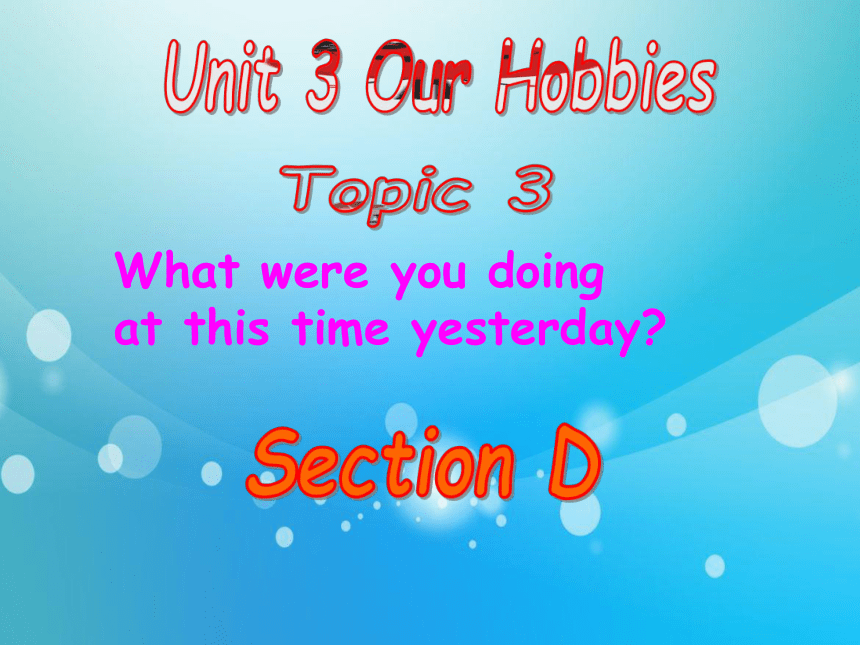 | |
| 格式 | ppt | ||
| 文件大小 | 6.3MB | ||
| 资源类型 | 教案 | ||
| 版本资源 | 仁爱科普版 | ||
| 科目 | 英语 | ||
| 更新时间 | 2022-10-15 18:32:08 | ||
图片预览

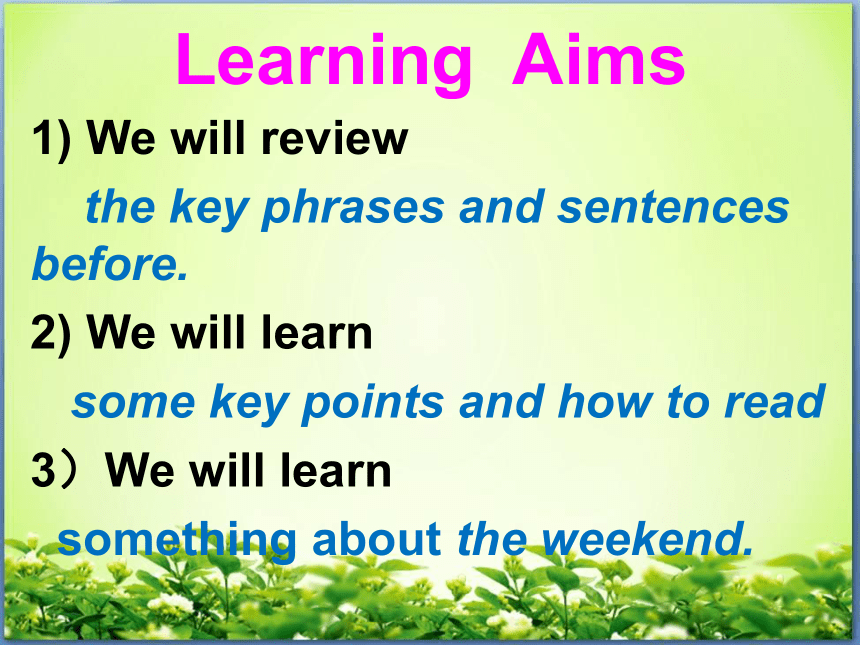
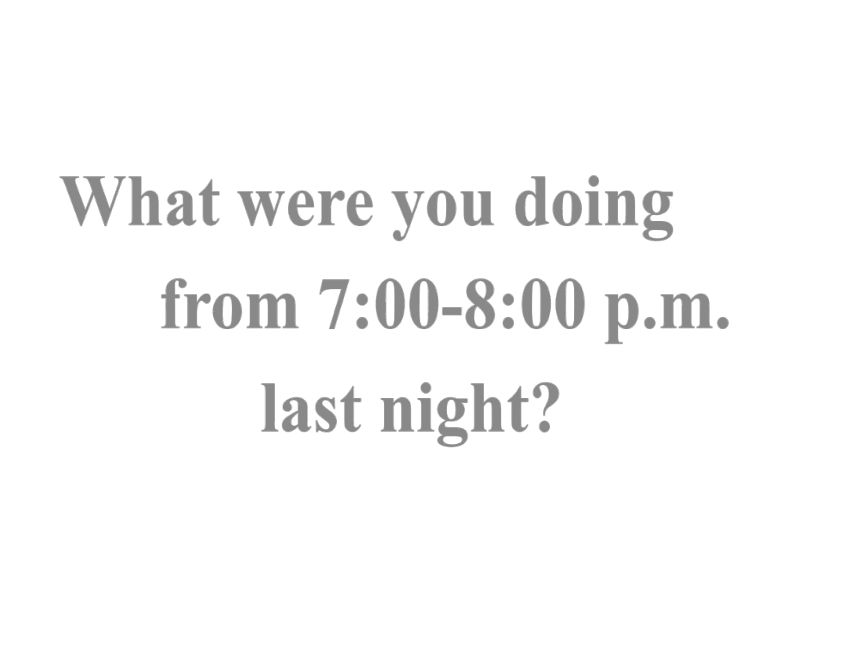
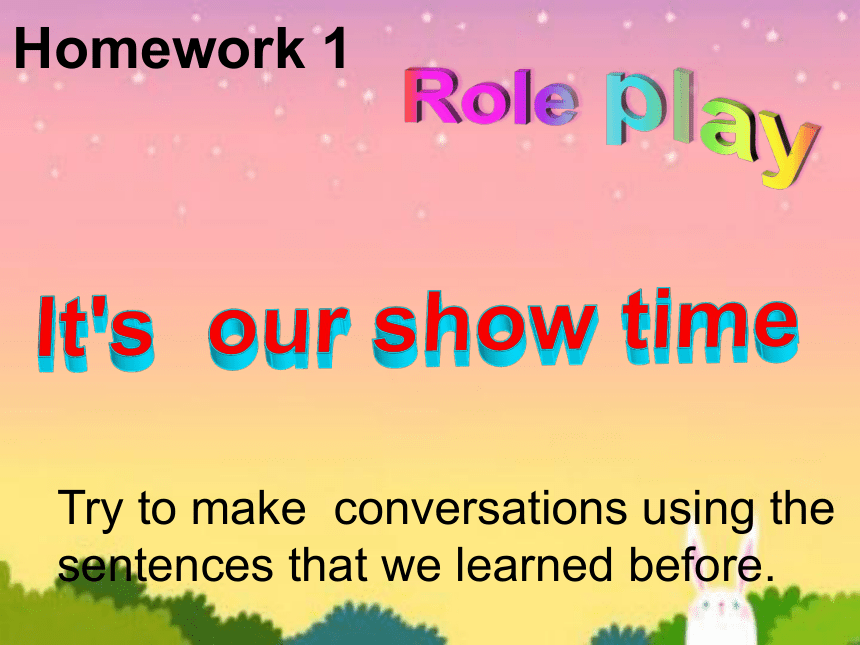

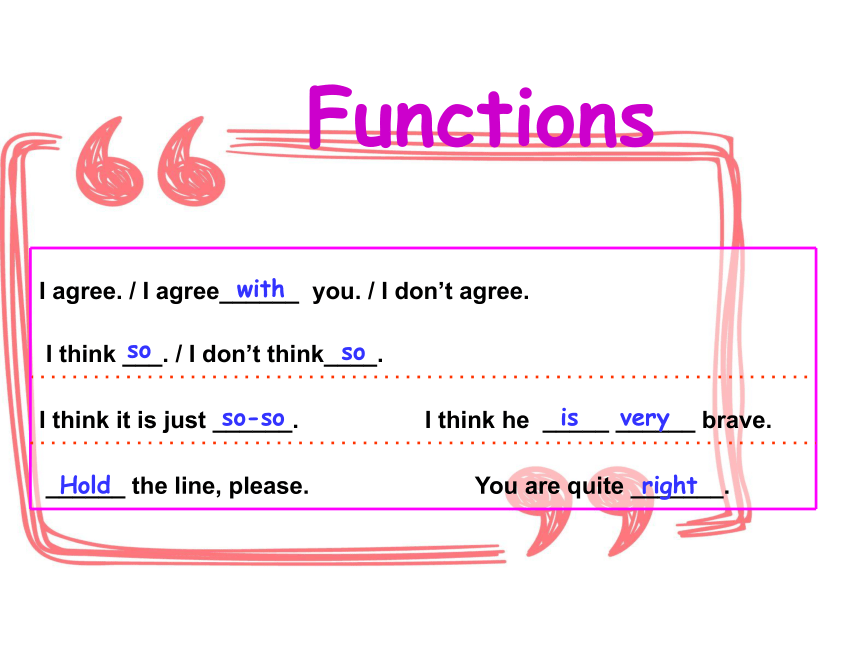
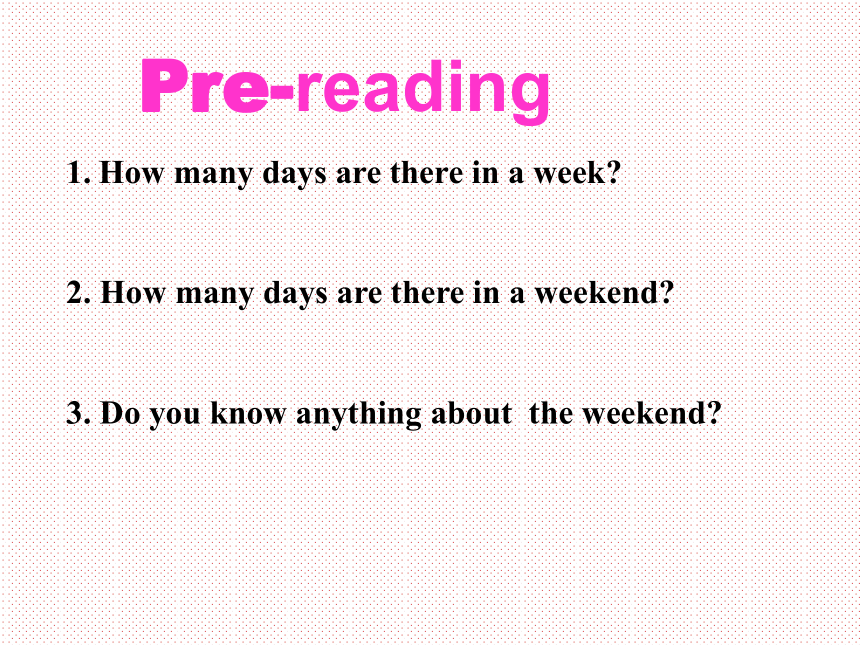
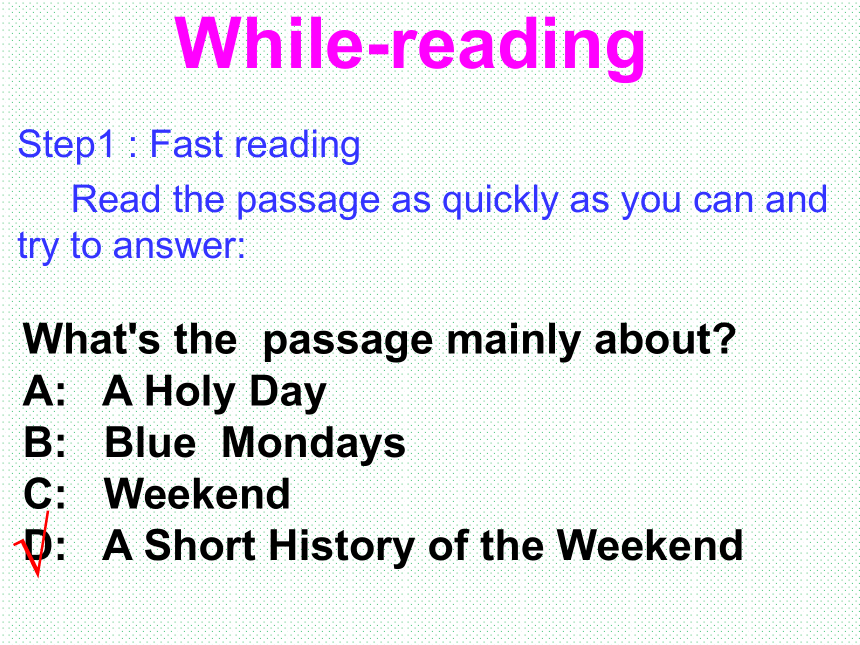
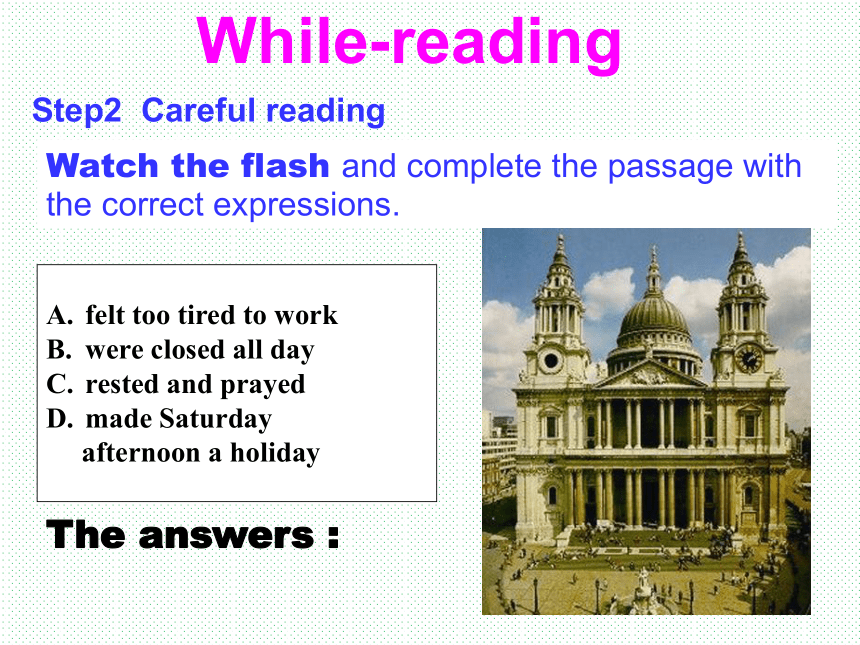
文档简介
(共22张PPT)
What were you doing at this time yesterday
Learning Aims
1) We will review
the key phrases and sentences before.
2) We will learn
some key points and how to read
3)We will learn
something about the weekend.
Homework 1
Try to make conversations using the sentences that we learned before.
Grammar
Past Continuous
I _____ ______ a shower at this time yesterday.
Many people ______ _______ together in their warm homes.
________ you playing computer games
Yes, I was. / No, I wasn’t.
What _______ you ________ at this time yesterday
I ______ _______ some clothes.
was taking
were getting
Were
were
doing
was washing
Homework 2
I agree. / I agree______ you. / I don’t agree.
I think ___. / I don’t think____.
I think it is just ______. I think he _____ ______ brave.
______ the line, please. You are quite _______.
Functions
with
so
so
so-so
is very
Hold
right
Pre-reading
How many days are there in a week
2. How many days are there in a weekend
3. Do you know anything about the weekend
Step1 : Fast reading
Read the passage as quickly as you can and try to answer:
What's the passage mainly about
A: A Holy Day
B: Blue Mondays
C: Weekend
D: A Short History of the Weekend
While-reading
√
Watch the flash and complete the passage with the correct expressions.
felt too tired to work
were closed all day
rested and prayed
made Saturday
afternoon a holiday
The answers :
While-reading
Step2 Careful reading
Watch the flash and complete the passage with the correct expressions.
felt too tired to work
were closed all day
rested and prayed
made Saturday
afternoon a holiday
The answers :
C A D B
While-reading
Step2 Careful reading
a holy day
When :
Where:
Who :
What :
before 1800
at church
many people
rest and pray
While-reading Step3 Read in details
Read the rest paragraphs in groups and mark T or F.
1.In the early 1800s, Satruday was the “ holy day”.
2.In the USA, workers called the Monday mornings “green Mondays”.
3. At one o'clock, no one worked in England.
4. By 1930, most American offices were closed on Saturday mornings.
5. By 1950, offices and factories in the USA were closed all day on Saturdays, and the two-day weekend began.
Sunday
blue
afternoons
1940
a two-day weekend 一个两天的周末
Example: a three-leg table
a seven-day holiday
an eight-year-old girl
And then they felt too tired to work on Monday mornings.
too...to...太...以致不能...
eg: I was too excited to sleep.
我激动得无法入睡。
Underline the phrases.
at church
play games
have fun
solve the problem
stop doing sth.
the beginning of
by 1930
be closed
Step1: Pre-reading(阅读前)
Make preparations for reading. (阅读前做好准备)
Step2: While-reading(阅读中)
Fast-reading: try to get the main idea of the text.
(快速阅读找出文章大意)
Careful-reading: try to know the details of the text (仔细阅读,理解细节)
Step3: Post-reading (阅读后)
Make a summary about what you have learnt from the passage.
(通过文章你学到了什么)
We learn:
some key phrases
a two-day weekend 一个两天的周末
a three-leg table 一张三条腿的桌子
a seven-day holiday 一个七天的假期
an eight-year-old girl 一个八岁大的女孩
a two-floor building 一幢两层的建筑
too...to... 太...以致不能...
we know
how to read a passage
a short history of weekend
A hobby is not a job or a school subject. A hobby is something you enjoy doing in your spare time. It’s not something you need to do. It’s just fun.
Some people make model ships, keep pets, plant flowers, play computer games or chat on the Internet. Some paint pictures or dance to music. Some collect everything from stamps to seashells (海贝壳)…
People take up hobbies because they think these activities can bring them many things like happiness, friendship and knowledge. Anyone, rich or poor, old or young, sick or well, can have a hobby. A hobby will make your life colorful.
( )41. What is a hobby
A. A job. B. A school subject. C. Something interesting. D. Something you enjoy doing in your spare time.
( )42. How many hobbies are mentioned (提到) in this passage
A. 7. B. 8. C. 9. D. 10.
( )43. Hobbies can bring people _______.
A. much money B. health
C. happiness, friendship and knowledge D. lots of trouble
( )44. What kind of people can have a hobby
A. Rich or poor. B. Old or young.
C. Sick or well. D. A、B and C.
( )45. When do people often take up hobbies
A. In their work time. B. In the daytime.
C. In their free time. D. In the holiday.
What were you doing at this time yesterday
Learning Aims
1) We will review
the key phrases and sentences before.
2) We will learn
some key points and how to read
3)We will learn
something about the weekend.
Homework 1
Try to make conversations using the sentences that we learned before.
Grammar
Past Continuous
I _____ ______ a shower at this time yesterday.
Many people ______ _______ together in their warm homes.
________ you playing computer games
Yes, I was. / No, I wasn’t.
What _______ you ________ at this time yesterday
I ______ _______ some clothes.
was taking
were getting
Were
were
doing
was washing
Homework 2
I agree. / I agree______ you. / I don’t agree.
I think ___. / I don’t think____.
I think it is just ______. I think he _____ ______ brave.
______ the line, please. You are quite _______.
Functions
with
so
so
so-so
is very
Hold
right
Pre-reading
How many days are there in a week
2. How many days are there in a weekend
3. Do you know anything about the weekend
Step1 : Fast reading
Read the passage as quickly as you can and try to answer:
What's the passage mainly about
A: A Holy Day
B: Blue Mondays
C: Weekend
D: A Short History of the Weekend
While-reading
√
Watch the flash and complete the passage with the correct expressions.
felt too tired to work
were closed all day
rested and prayed
made Saturday
afternoon a holiday
The answers :
While-reading
Step2 Careful reading
Watch the flash and complete the passage with the correct expressions.
felt too tired to work
were closed all day
rested and prayed
made Saturday
afternoon a holiday
The answers :
C A D B
While-reading
Step2 Careful reading
a holy day
When :
Where:
Who :
What :
before 1800
at church
many people
rest and pray
While-reading Step3 Read in details
Read the rest paragraphs in groups and mark T or F.
1.In the early 1800s, Satruday was the “ holy day”.
2.In the USA, workers called the Monday mornings “green Mondays”.
3. At one o'clock, no one worked in England.
4. By 1930, most American offices were closed on Saturday mornings.
5. By 1950, offices and factories in the USA were closed all day on Saturdays, and the two-day weekend began.
Sunday
blue
afternoons
1940
a two-day weekend 一个两天的周末
Example: a three-leg table
a seven-day holiday
an eight-year-old girl
And then they felt too tired to work on Monday mornings.
too...to...太...以致不能...
eg: I was too excited to sleep.
我激动得无法入睡。
Underline the phrases.
at church
play games
have fun
solve the problem
stop doing sth.
the beginning of
by 1930
be closed
Step1: Pre-reading(阅读前)
Make preparations for reading. (阅读前做好准备)
Step2: While-reading(阅读中)
Fast-reading: try to get the main idea of the text.
(快速阅读找出文章大意)
Careful-reading: try to know the details of the text (仔细阅读,理解细节)
Step3: Post-reading (阅读后)
Make a summary about what you have learnt from the passage.
(通过文章你学到了什么)
We learn:
some key phrases
a two-day weekend 一个两天的周末
a three-leg table 一张三条腿的桌子
a seven-day holiday 一个七天的假期
an eight-year-old girl 一个八岁大的女孩
a two-floor building 一幢两层的建筑
too...to... 太...以致不能...
we know
how to read a passage
a short history of weekend
A hobby is not a job or a school subject. A hobby is something you enjoy doing in your spare time. It’s not something you need to do. It’s just fun.
Some people make model ships, keep pets, plant flowers, play computer games or chat on the Internet. Some paint pictures or dance to music. Some collect everything from stamps to seashells (海贝壳)…
People take up hobbies because they think these activities can bring them many things like happiness, friendship and knowledge. Anyone, rich or poor, old or young, sick or well, can have a hobby. A hobby will make your life colorful.
( )41. What is a hobby
A. A job. B. A school subject. C. Something interesting. D. Something you enjoy doing in your spare time.
( )42. How many hobbies are mentioned (提到) in this passage
A. 7. B. 8. C. 9. D. 10.
( )43. Hobbies can bring people _______.
A. much money B. health
C. happiness, friendship and knowledge D. lots of trouble
( )44. What kind of people can have a hobby
A. Rich or poor. B. Old or young.
C. Sick or well. D. A、B and C.
( )45. When do people often take up hobbies
A. In their work time. B. In the daytime.
C. In their free time. D. In the holiday.
同课章节目录
- Unit 1 Playing Sports
- Topic 1 I'm going to play basketball.
- Topic 2 I'll kick you the ball again.
- Topic 3 The school sports meet is coming.
- Unit 2 Keeping Healthy
- Topic 1 You should brush your teeth twice a day.
- Topic 2 I must ask him to give up smoking.
- Topic 3 Must we exercise to prevent the flu?
- Unit 3 Our Hobbies
- Topic 1 What's your hobby?
- Topic 2 What sweet music!
- Topic 3 What were you doing at this time yesterday
- Unit 4 Our World
- Topic 1 What's the strongest animal on the farm?
- Topic 2 How can we protect ourselves from the eart
- Topic 3 The Internet makes the world smaller.
